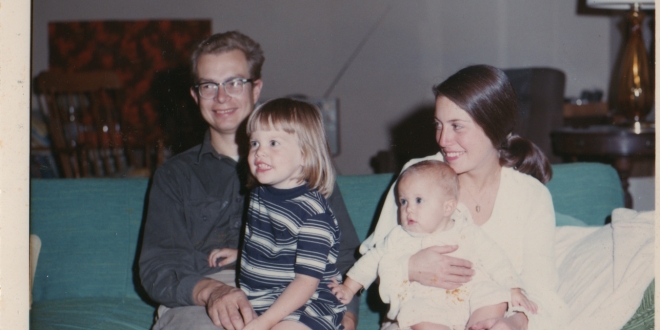Those who know me or have read my books know that I have written a lot about my father (a lot!) but not very much about my mother. My mother died when I was nineteen, after a protracted battle with cancer that overshadowed my adolescence. She called me at college in October, at the beginning of my freshman year, to tell me that she had lung cancer, and by August she was gone. After she died, my father, my sister and I stumbled through planning her memorial, closing out her life, and figuring out how to exist without her – more as individuals than a family. I have spent more years without her than I had with her.
Although at nineteen, I wasn’t strictly a child, losing my mother at such a young age was devastating. Your mother, hopefully, encourages you and validates your choices, teaches you how to manage life events, and is present for those events. She imparts femininity to you, and what it means to be a woman, and how to care for your female body, and she most likely becomes your model for how to be a woman and even a mother. I was just barely learning how to be a woman when she died, and I was left without a clue how I would manage life events, or an idea of what she would have done, or not done, in similar situations.
Perhaps a worse thing – in the long term, anyway – is that I was left holding her side of the story, in effect. I think sometimes we feel closer to one parent than the other, often our mother, and we hold onto beliefs about them – and project things onto them – that aren’t necessarily true. Because she was the one who died, and I didn’t have information to the contrary, I held onto the belief that my mother was the good parent, who loved and supported us, and that my father was the issue, with his depression and lack of connection. For years, I’ve blamed my father for the problems with our family, but I can now see that she was just as responsible for my family dynamics. I am able to see now that my mother wasn’t the person I thought she was, something I might have known by now if she had lived; something which would have allowed me to explore myself and my family more honestly.
Although I’ve always been open about some of the unhealthy things my mom did, I never allowed myself to explore what was going on behind them. In fact, she was probably depressed herself, and had been for years, and I think she may have engineered much of the family dysfunction; maybe more than my dad. I’ve talked about how she made my sister and me into her own little club, excluding my father, but never realized that she also subtly ensured that we regarded my father as something of an ogre. In reality, the rules and strictures my sister and I lived under were actually probably more hers than his, created by her in anger or for her own convenience. I’ve talked about how enraged she could get – slamming cupboards and doors, swearing, and even breaking things – but never thought about the fact that she didn’t allow my sister and I to have big feelings any more than my father did.
It’s taken me so long to see where some of my codependent tendencies come from! She was very codependent, with the accompanying resentment about the effort being given. I think she developed her codependency in her youth – her father was a functioning, amiable, alcoholic, enabled by his wife and daughter. Not surprisingly for her era, I don’t believe she ever dealt with the disappointment, rage, and resentment that having an alcoholic parent engenders. My grandmother hadn’t wanted children and my mother was a surprise. After she was born, my grandmother flipped and became needy and overly dependent on my mother; she was also insecure and dependent on her religion (Christian Science). In the end, my grandparents disliked each other intensely and relied too much on my mother.
I believe she was deeply disappointed about how her life had gone: giving up a college scholarship to marry my father at twenty-one; being a mother and housewife at a time when that’s all women were encouraged to be; and married to a man who was often depressed and uncommunicative. While she did make efforts to change herself and her life – getting her Master’s degree and a job in a local library – I can see now that she resisted making too many choices and too much change; perhaps out of fear, or uncertainty – preferring instead to remain a victim and martyr.
Although it was easier to blame my father, I think it’s healthier knowing the truth. I am sorry that I only knew her as a child knows a parent and that I will never be able to talk to her as an adult about her life, her dreams and desires. I will never be able to ask her the reasons behind many of the choices she made as my parent, and never be able to tell her my feelings about her. There is so much I will never know, including who my mother might have truly been.
I do appreciate the chance to think more honestly about who she was and what she did, although it is sometimes difficult. It allows me to look at the world and the people in my life more honestly, more equably. As I get older, I’m learning in my own relationship that it’s never all one person’s fault and that problems are never one-sided, although that’s a tough lesson. If she had lived, perhaps she and I could have learned it together and supported each other through it.


Great post! Great blog!
LikeLike